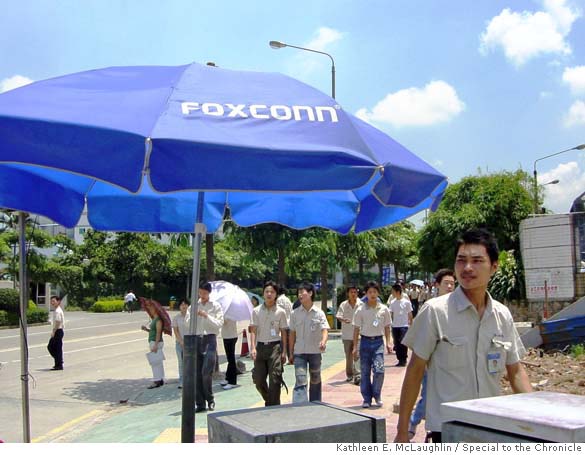
The saga of Chinese manufacturer Foxconn continues. Following the decision to double the wages of many of its employees, the factory, which is owned by the Taiwanese company Hon Hai, has now announced that in order to absorb the labor increase, it will raise its production prices. According to a report from the Associated Press, Foxconn will begin to increase their costs in October, when the wage increases are scheduled to take effect.
The cost increase marks the latest bout of public exposure for the largest electronics manufacturing factory in the world. Although the current news is the latest domino to drop following a spate of suicides that left 11 dead in six months, at least one and possibly more dead from exhaustive work shifts, and an undisclosed number injured, the spotlight first struck Foxconn in 2009 when an employee allegedly committed suicide following the loss of an iPhone prototype. Despite the friends of the employee reporting that the man that died was detained and beaten by Foxconn security, the death was ruled a suicide, but the name Foxconn was not forgotten.
Once the suicides began, public attention was again drawn to the factory, and especially to the working conditions that many labor groups labeled as “hellish”. The negative reactions became so intense, that the Chinese government threatened to intercede into the Taiwanese-owned company, and suggested that labor unions were a possible solution. Hon Hai then promised wage increases of 20 percent, and in some cases, many of the lowest paid employees would receive double their current wages. The pay increase seemed to settle the immediate ire of the public, but consequences seemed inevitable as the wage increase seemed to be a piece of a bigger movement to improve the overall working conditions for all Chinese laborers.
China, the world’s biggest manufacturer, has recently faced an increase in labor related strikes and protests, including a recent strike at a Honda factory that gained notoriety around the same time as the announcement of the Foxconn wage increases. The movement has been slow to catch on, but we could be seeing the beginning of the end of cheap labor in China.
Foxconn has not released specifics yet on how they will handle the cost increase, but the AP report suggests that the company will move much of the mass production inland to cheaper production facilities, automate more factories, and move some of the labor to other southeast Asian countries, including Thailand.
It is also unknown how the cost increase will affect the pricing of electronic goods around the world. Technology that is currently on the shelves is unlikely to raise its cost for fear of losing ground to a company willing to eat the costs increase, but it could have longer lasting implications in the years to come.


